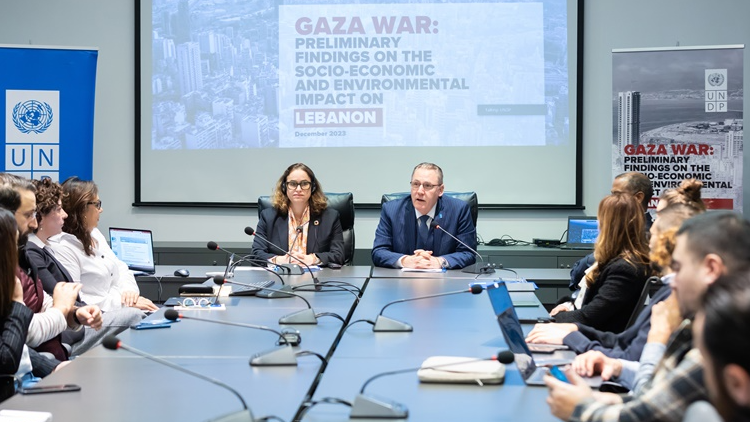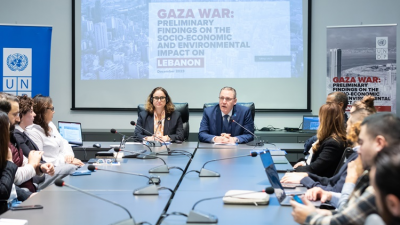The United Nations Development Programme (UNDP) launched a report today titled "Gaza War: Preliminary Findings on the Social, Economic, and Environmental Impact on Lebanon," which provides an initial analysis of the potential impacts and consequences of the ongoing Gaza war on the Lebanese economy, key economic sectors, and the environment, focusing on border areas in southern Lebanon. Dr. Abdallah Daar, Assistant Secretary-General of the United Nations and Director of the Regional Office for Arab States at UNDP, stated: "This report follows previous assessments that highlighted the severe social and economic effects of the Gaza war on countries in the Arab region. We need urgent measures to build social and economic resilience in Lebanon and other countries affected by the conflict in Gaza and the occupied Palestinian territories. In Lebanon, the developmental response to the crisis must be closely linked to the implementation of necessary reforms to revive the economy."
A statement from the United Nations Information Centre noted that "key economic sectors, including tourism, services, and agriculture, have been most affected, providing employment and income for a significant portion of Lebanon's population, and there is a high risk of economic contraction." It pointed out that "nationally, the tourism and services sectors, which contribute significantly to GDP and job creation, have witnessed a noticeable decline since the onset of conflict, as evidenced by dwindling traveler numbers and demand for hospitality services like hotels and restaurants."
It also mentioned that "the Lebanese Directorate General of Civil Aviation recorded a higher number of departing flights than arriving ones in October 2023, with a 15% decrease in passenger flow compared to October 2022. During the same period, hotel occupancy rates in Lebanon fell to below 10% due to early departures of visitors and flight cancellations."
Furthermore, it noted that "compared to the first week of October 2023, restaurant activity nationwide declined by up to 80% on weekdays and by 30-50% on weekends following the onset of the conflict."
The report revealed an additional risk stemming from the cessation of financial flows and remittances, which exacerbates challenges in an already disrupted banking environment. In 2022, Lebanon recorded the highest remittance-to-GDP ratio in the Middle East and North Africa at 37.8%, equivalent to about 7 billion USD annually. Currently, over 70% of this capital reaches the country through informal channels, such as individuals carrying cash across borders. A decrease in passenger flow would negatively impact remittance inflows, which provide a crucial social safety net for a large segment of the population.
The statement highlighted that "tariffs on international trade, including customs and value-added tax, account for over 60% of total tax revenues. Any disruption to imports would jeopardize the government's efforts to restore fiscal balance and pose further risks to economic recovery in Lebanon."
Melanie Haunstein, UNDP Resident Representative in Lebanon, said: "Every day, we witness the profound effects of conflict on the lives and livelihoods of people in southern Lebanon and beyond. This preliminary analysis offers a snapshot of the humanitarian, social, economic, and environmental tragedy as it unfolds in real-time. It helps to provide the necessary information for immediate social, economic, and livelihood support while having a longer-term vision for the developmental needs of these communities, laying the groundwork for a more sustainable recovery."
The statement also mentioned "significant losses reported in the agricultural sector in the conflict-affected region, which is a key livelihood source in the border areas of southern Lebanon, due to land damage, chemical contamination, and pollution from explosive remnants leading to loss of soil fertility."
It explained that "phosphorus shelling has increased crop and water source contamination, posing threats to livestock and human health. Major crops such as olives, carobs, grains, and winter crops have been significantly impacted, with reports indicating that around 47,000 olive trees have been burned."
Additionally, it pointed out that "the conflict has caused substantial losses in livestock, poultry, and aquaculture. Among the reported slaughtered farm animals are approximately 200,000 birds and 700 head of livestock, as well as the destruction of 250 beehives and 60 greenhouses. Violence has also restricted local fishermen's access to fishing areas."
The report provides an initial assessment of environmental impacts, highlighting negative consequences on protected areas, forests, pastures, water bodies, air quality, and land. There are preliminary indications that the use of white phosphorus has caused widespread environmental damage, affecting natural ecosystems, water quality, and posing ongoing risks to human health and safety. More research is needed to assess the full impact.
It mentioned that "over the past three months, 91 villages in Nabatiyeh and southern Lebanon have experienced 1,768 attacks, resulting in injuries and internal displacement of 64,000 people, causing extensive damage to housing and businesses."
The assessment is based on a desk review of available data, complemented by informal interviews with key stakeholders and preliminary data collected by the UNDP team. This report follows the release of two other UNDP and ESCWA reports: "Potential Social and Economic Impacts of the Gaza War on Neighboring Arab Countries" and "Gaza War: Potential Social and Economic Impacts on the State of Palestine."




